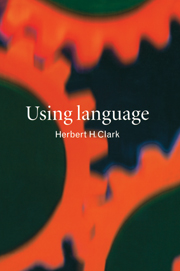4 - Common ground
Published online by Cambridge University Press: 05 June 2012
Summary
If a lion could talk, we could not understand him.
Ludwig Wittgenstein, Philosophical Investigations
Everything we do is rooted in information we have about our surroundings, activities, perceptions, emotions, plans, interests. Everything we do jointly with others is also rooted in this information, but only in that part we think they share with us. The notion needed here is common ground.
Common ground is a sine qua non for everything we do with others – from the broadest joint activities (Chapter 2) to the smallest joint actions that comprise them (Chapter 3). For my son and me to act jointly, he and I have to coordinate what we do and when we do it. And to coordinate, we have to appeal, ultimately, to our current common ground. At the same time, with every joint action he and I perform, we add to our common ground. This is how joint activities, from chess games to business transactions, progress (Chapter 2). When my son and I enter a conversation, we presuppose certain common ground, and with each joint action – each utterance, for example – we try to add to it. To do that, we need to keep track of our common ground as it accumulates increment by increment.
Common ground is important to any account of language use that appeals to “context.” Most accounts don't say what context is, but rely on our intuitions about the circumstances of each utterance. These appeals are no better than a psychic's visions of next year's stock prices – and less predictive. With an undefined notion of context, as with an indefinite future, anything is possible.
- Type
- Chapter
- Information
- Using Language , pp. 92 - 122Publisher: Cambridge University PressPrint publication year: 1996
- 13
- Cited by



